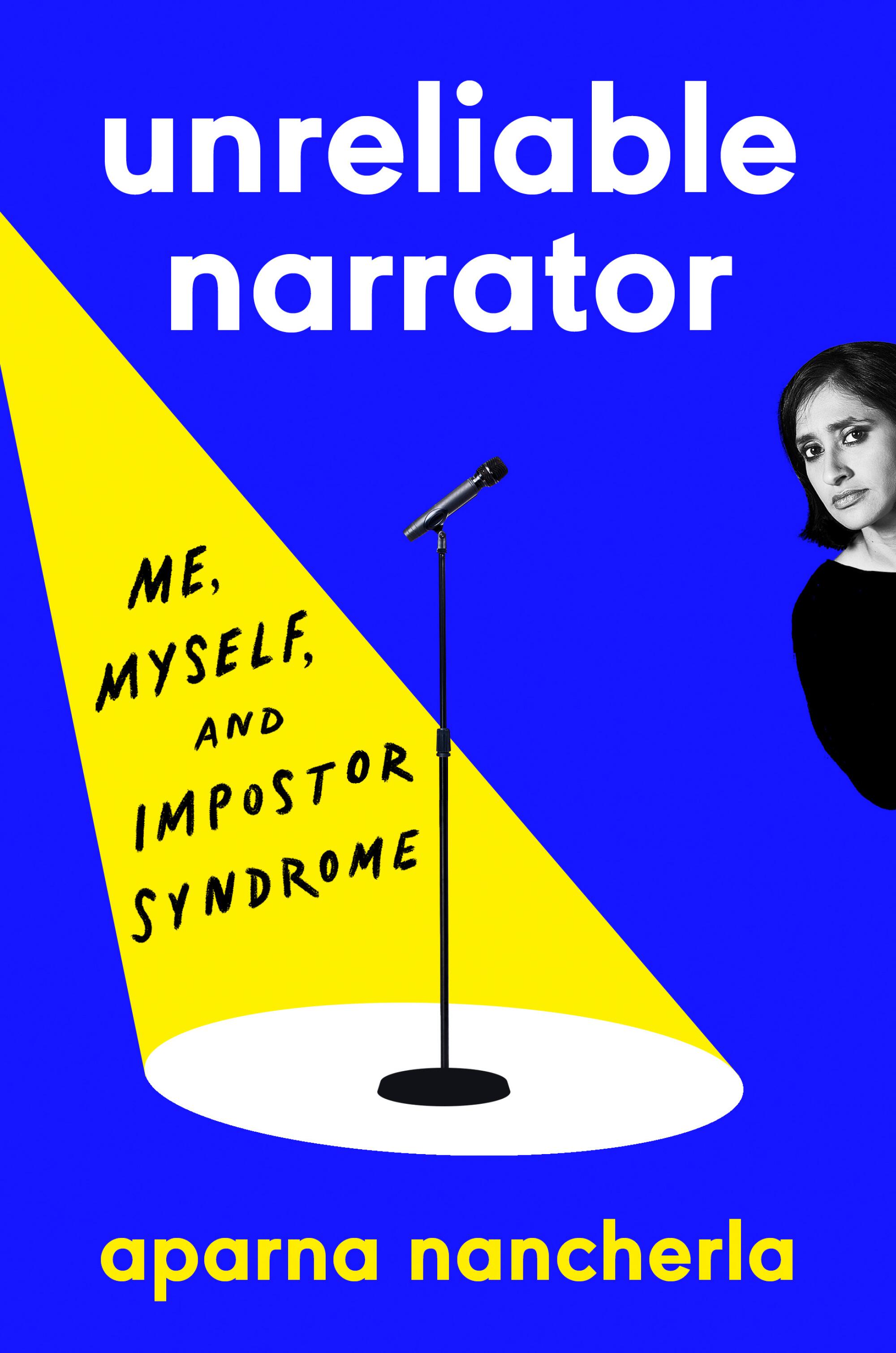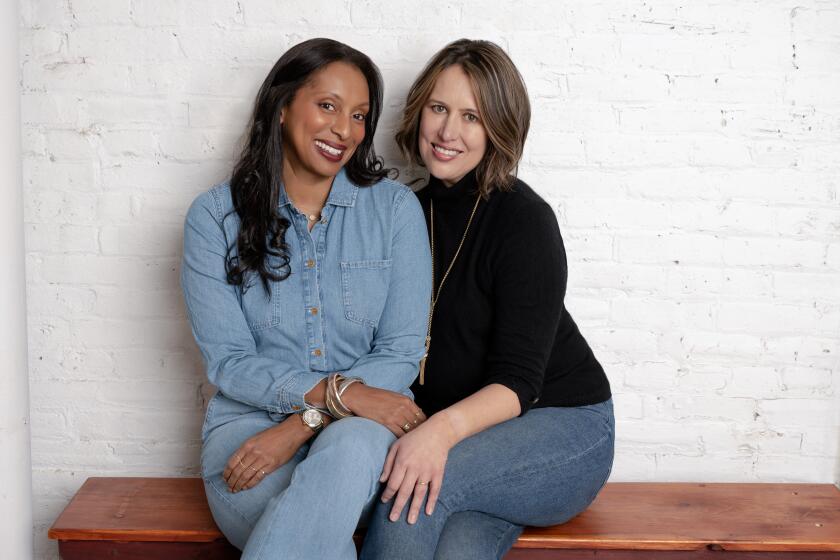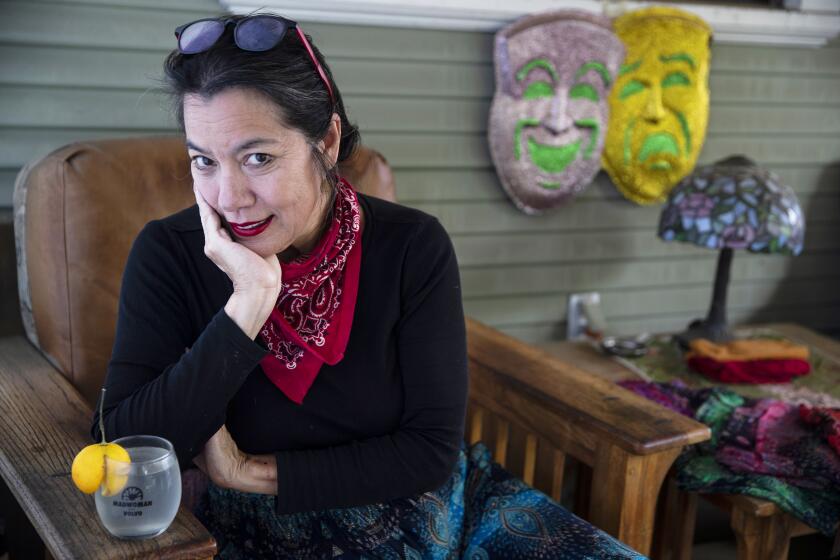
On the Shelf
Unreliable Narrator: Me, Myself, and Impostor Syndrome
By Aparna Nancherla
Viking: 304 pages, $28
If you buy books linked on our site, The Times may earn a commission from Bookshop.org, whose fees support independent bookstores.
Aparna Nancherla is not the funny girl I expected. Not over our recent lunch at Figaro Bistrot in Los Feliz and not in the book she’s here to discuss: “Unreliable Narrator,” her super-smart, deliciously readable, achingly poignant and — OK — occasionally humorous new collection of essays stitched together from the frayed threads of her self-esteem.
The funny thing is, Nancherla is a well-known, well-respected comedian. Maybe she’s cracked you up on her Netflix sets or Comedy Central specials; on oddball series, including “Inside Amy Schumer” and “Master of None”; or as the voices of animated characters on “BoJack Horseman” and “The Great North.” So her relative earnestness on the page is something of a surprise, though hardly a shock. You know the saying about comedy being the refuge of the chronically sad? “Unreliable Narrator” is proof.
“On the heels of moderate success as a comedian,” Nancherla greets us on Page 1, “I still only warily accept I’ve accomplished anything or that I ever could again… It’s almost like my impostor syndrome is the majority of me, and the rest is my shadow … Every day was Take Your Doubter to Work Day!”
He’s interviewed Neko Case, Jeff Tweedy and Maria Bamford about depression. With his new memoir, “The Hilarious World of Depression,” John Moe looks inward.
A few minutes into our conversation, I confess that I approached her book and this lunch expecting a laugh a minute, rather than a deep dive into several overlapping syndromes. “Comedy reminds me how silly my hemming and hawing can be in the grand scheme of things,” she says. “But I wrote the book to explore the less resolved parts of myself. You can’t quite dig far enough into the gray areas of life if you need to find the release of a joke.”

The collection has some of the riffy banter of even serious books by comedians but also so much more. The sum of its parts is a cogent mashup of studies and stats on self-esteem filtered through Nancherla’s personal experience, crafting a portrait of the social foibles that make and break her (and many of us). Racism, for one. Growing up, she writes, “I knew I was South Asian.” But she believed she was “ Almost White (like a fake Chanel bag, so close, and yet not at all).” Nancherla cites sociologist Tressie McMillan Cottom on internalized oppression, commenting, “It’s the model minority way — there’s no one to blame but yourself!”
Between sips of passion fruit iced tea, Nancherla discusses how being a woman of color affects her career. “You experience negatives that don’t seem to affect your white or male counterparts. Like being considered for fewer opportunities because of how you look. And when you do get the job, you never know whether you’re being valued for your actual ability or as ‘woke’ set dressing.”
True to form, Nancherla takes more than her share of responsibility for these injustices. “When I started pursuing a career in entertainment, I had no idea what my goals were. I was amazed to be allowed to show up at all, not just because of my external identity but also because of my own level of self-doubt.”
In 2018, Christine Pride teamed up with Jo Piazza to write a novel about an interracial friendship. It went so well they wrote a second, “You Were Always Mine.”
Each chapter of “Unreliable Narrator” plumbs one of Nancherla’s many emotional pain points. “Be Free, You Wrinkly Ghost!” opens, “I’ve never been fully on board with my face” and goes on to detail the surgeries Nancherla has undergone to correct a droopy eyelid and underbite. “Considering that so many beautiful people did nothing to earn their looks, you’d think the people who put in the time and effort to achieve theirs would be more respected under the ‘bootstraps’ mentality of the American dream. But no.” She is ultimately ambivalent about it: Maybe she should have tried to succeed au naturel. “On some level,” she concludes, “I’m jealous I didn’t give myself the chance.”

In the same chapter, Nancherla weighs the ups and downs of her college bout with anorexia. “I know what you’re thinking. In an arena typically dominated by white females, I am a trailblazer! Representation matters!” Then she drops the joke: “The ugly truth was that my body disappearing made me more visible — in a good way.”
It’s not just the book’s serious notes but also the weight of Nancherla’s ambivalence that makes her message stand out — it’s a kind of counterprogramming against the go-go girlboss narratives that dominate many women’s memoirs. Is it anti-feminist, I ask?
“Questioning or expressing doubt doesn’t automatically mean making a woman smaller or weaker,” Nancherla says. “That’s a construct that’s been drilled into us. The masculine ideal is presenting yourself without fears or hesitation. A more feminine approach is to explore the contradictions in wanting power. I find the woman’s way far more engaging. I mean, what’s wrong with expressing doubt? I don’t even know who I’d be without that.”
Out with the essay collection ‘No One Asked For This,’ David talks candidly about nepotism, Pete Davidson and a terrifying, hilarious web of neuroses.
Also much appreciated: Nancherla doesn’t offer the standard it-gets-better catharsis, which can insinuate that self-confidence comes standard with Nancherla-level success. “That’s the tricky thing about impostor syndrome,” she says. “It feels genuinely indisputable. Mine has only grown more insistent as I’ve built my career.”
A few weeks after my lunch with Nancherla, I caught her in her element, owning the stage at the sold-out Elysian Theater. She was a consummate professional, flawlessly delivering a monologue about her flawed self, her honesty on the page transformed into hilarity onstage. Post-show, she introduced me to her fiancé, indie book publisher Gabriel Levinson. Deflecting sincere compliments on her performance, Nancherla mentioned that her first book’s pub date was only a few weeks away, an experience known to throw even the healthiest writer into a crisis of self-doubt. I asked if there was anything she regretted putting in the book.
“I didn’t put any limits on writing about my own life,” she said. “My only guardrails were not to disclose too much about other people in my life, since their stories are not fully mine to tell.”
When it comes to herself, though, Nancherla discloses freely and mercilessly. She sees her work as a way to reach in and out, beyond comedy, to readers who might need more than a laugh.
The textbook model of a cross-platform artist, Loh talks about her COVID-themed science podcast and her new memoir, “The Madwoman and the Roomba.”
“I still struggle with a lot of the things I write about,” she confides. “Mental illness, productivity, being the center of attention. I wanted to give voice to how much ambiguity and competing impulses and messiness inform the process of being alive. I hope that by sharing my own vulnerabilities, I can offer some space for the reader’s.”
Just don’t expect her to feel great about it. “I guess I’m both disgusted I wrote it,” she says, “and glad it’s out of my hands and out in the world.”
Maran is the author of “The New Old Me” and a dozen other books. She lives in Silver Lake.
More to Read
Sign up for our Book Club newsletter
Get the latest news, events and more from the Los Angeles Times Book Club, and help us get L.A. reading and talking.
You may occasionally receive promotional content from the Los Angeles Times.









